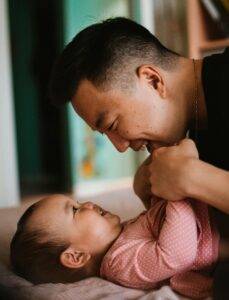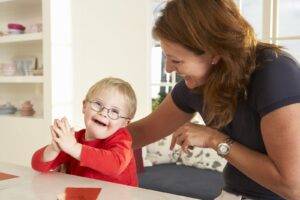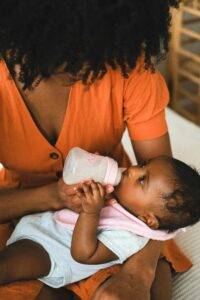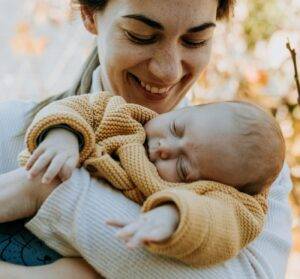One of the most exciting aspects of welcoming a newborn into your life is watching them grow and develop, hitting milestones indicating they are thriving. One crucial area of development that often goes unnoticed is hearing. What newborn baby can hear impacts their ability to interact with the world and is tightly linked to speech development.
So, what should you know about newborn baby hearing development? This guide will delve deep into the stages, provide tips for supporting hearing development, discuss potential signs of hearing issues, and emphasize the importance of early detection through newborn hearing screenings.
Understanding the Beginning: What Newborn Baby Can Hear?
Newborns enter the world equipped with the ability to hear, although their hearing isn’t fully developed at birth. The journey of hearing development starts long before a baby takes their first breath, and understanding this process helps parents better support their child’s growth.
Hearing Begins in the Womb
Surprisingly, a baby’s auditory journey begins in the womb. Around the 18th week of pregnancy, the fetus starts to detect sounds. At this stage, the sounds they hear are muffled due to the amniotic fluid and the layers of the mother’s body, but they can discern rhythms and patterns, especially from the mother’s voice.
By 25 weeks of pregnancy, the fetus’s hearing advances when it recognizes the mother’s voice and reacts to familiar sounds from the outside world. This early exposure to sound is crucial because it primes the brain for the complex auditory tasks it will encounter after birth.
The Newborn’s First Encounters with Sound
Once born, a newborn is thrust into a world of new and varied sounds. Their hearing will mature rapidly over the first few months of life. Initially, they respond reflexively to loud noises, often startling or blinking. This reaction, known as the startle or Moro reflex, is a reassuring sign that their auditory system is functioning.
During the first few months, you notice your newborn calms down when they hear your voice. This is a sign that they recognize your voice and that their hearing and brain work together to provide comfort. The baby’s brain is processing sounds actively, laying the foundation for more complex auditory skills.
What Newborn Baby Can Hear: The Stages of Hearing Development
Hearing development in newborns doesn’t happen overnight. It’s a gradual process broken down into several key stages. Each stage is important for your baby’s growth and provides insights into their progress.
0 to 3 Months: The Early Stages of Sound Recognition
In the first three months of life, your baby is adapting to their new environment. They recognize and respond to familiar voices, particularly those of their parents. Your baby is soothed by your voice or turns their head towards you when you speak. This early recognition is the first indication that their hearing is developing appropriately.
Also, observe how your baby reacts to different sounds. Loud noises should startle them, and they calm down or become more alert to softer and familiar sounds. The ability to differentiate between types of sounds marks the beginning of their auditory discrimination skills, which are essential for speech later on.
3 to 6 Months: Engaging with the World Through Sound
Between three to six months, your baby’s hearing becomes more refined. They will react more noticeably to various sounds. You see them smile or coo when you talk to them or when they hear certain sounds like the rustling of a toy or the jingle of a bell. This period is also when babies experiment with sounds, often through babbling.
This babbling is more than just cute; it’s a critical stage in their hearing and speech development. By mimicking, babies understand the basic patterns and rhythms of language. Your baby also recognizes the source of different sounds. For example, they may turn their head towards a voice or a toy making noise.
This is an important developmental milestone known as sound localization. Babies identify where a sound is coming from helps them understand their environment better and is a sign of healthy auditory development.
6 to 12 Months: The Leap to Language Understanding
As your baby approaches the six-month mark, their hearing development takes a significant leap forward. They understand and respond to simple words, especially those that are used frequently around them, such as “mama,” “dada,” or “no.” This period is critical for the development of their language skills. Babies learn by listening.
Your baby’s ability to recognize and differentiate sounds is more advanced and they associate certain sounds with specific actions or people. During this stage, your baby becomes more responsive to conversations. They mimic words or sounds, and they will understand the tone of your voice—whether you’re happy, excited, or displeased.
12 Months and Beyond: Building a Vocabulary
Most babies will have a small but growing vocabulary by their first birthday. They say a few words and will understand many more. Their ability to follow simple instructions, such as “Come here” or “Give me the toy,” will also improve.
This stage is closely tied to their ability to communicate, and a clear indicator that their auditory processing skills are on the right track. As they grow, your baby’s vocabulary expands rapidly. The more they hear, the more they’ll learn. Encourage listening to different sounds and speaking new words to develop their hearing and language skills.
How to Support Your Baby’s Hearing Development
As a parent, you can actively support your baby’s hearing development. The first year of life is particularly crucial, as this is when the auditory system is most malleable and responsive to external stimuli. Here are some strategies to ensure your baby’s hearing develops optimally.

- Engage in Frequent Conversations: Talking to your baby is one of the most effective ways. Even if your baby doesn’t understand what you say, they’re learning the patterns and rhythms of speech. The more language they’re exposed to, the better their auditory and language skills will develop.
- Incorporate Music into Daily Activities: Music is a powerful tool in promoting hearing development. Playing music introduces your baby to different sounds, tempos, and rhythms. Don’t limit yourself to traditional lullabies; any genre of music is beneficial. Play classical music during quiet times, upbeat tunes during playtime, or your favorite songs as you go about your day.
- Utilize Sound-Making Toys: Toys that produce sound, like rattles, bells, and interactive musical toys, stimulate the auditory senses. These toys encourage your baby to explore sound and understand cause and effect. This is an important step in their cognitive and auditory development.
- Encourage and Respond to Babbling: This is crucial in your baby’s auditory and speech development. When your baby babbles, they experiment with the sounds they’ve heard and are beginning to practice speaking. This interaction helps reinforce the connection between hearing and speech, needed for language development.
- Protect Your Baby’s Hearing: While exposing your baby to varied sounds, protect their delicate ears from loud noises. Babies have more sensitive hearing than adults, and exposure to loud sounds damages their developing auditory system. Keep your baby away from loud noises, like concerts, fireworks, or construction sites.
Hearing Problem Indicators in Newborns
Early detection of hearing problems impacts your baby’s development. While most newborns have normal hearing, be aware of the signs that might indicate an issue. The sooner a hearing problem is identified, the sooner it can be addressed, minimizing its impact on your baby’s development.
- Lack of Startle Response: A healthy newborn will startle or blink in response to sudden, loud noises. If your baby doesn’t react to such sounds, it could be an early sign of hearing loss. This is particularly noticeable in the first few weeks of life when the startle reflex is strong.
- No Reaction to Your Voice: At three months, your baby should recognize and respond to your voice, calming down when they hear you speak. If your baby doesn’t react to your voice or other familiar sounds, it may be worth discussing with your pediatrician. This lack of response could indicate your baby isn’t hearing.
- Difficulty Locating Sounds: Around six months of age, babies begin to turn their heads toward the source of a sound. This ability to localize sound is an important milestone in hearing development. If your baby isn’t turning their head towards noise or seems unaware of where sounds are coming from, it could indicate a problem.
- Limited or No Babbling: Babbling is a key indicator of healthy hearing and speech development. If your baby isn’t babbling by six months, or if their babbling suddenly decreases or stops, have them checked. Babbling is the first step towards speaking, and delays in this area signal underlying hearing problems.
- Delays in Speech Development: If your baby isn’t saying any words by their first birthday or doesn’t attempt to communicate with sounds or gestures, it could be a sign of a hearing issue. Speech development is closely linked to hearing, so delays in one result in problems with the other. Early intervention mitigates these delays.
Suspecting a Hearing Problem? Here are the Steps to Take
If you notice any signs that suggest your baby might have a hearing problem, act quickly. Early intervention is key to ensure your baby’s development remains on track.
- Schedule a Hearing Test: The first step in addressing a potential hearing problem is to schedule a hearing test with a pediatric audiologist. This specialist performs a detailed assessment of your baby’s hearing to determine whether there’s a problem and, if so, the severity. Early testing is crucial for prompt intervention.

2. Understand and Explore Treatment Options: If your baby is diagnosed with a hearing problem, treatment options are available depending on the type and severity of the hearing loss. These options may include hearing aids, cochlear implants, or other assistive devices to help your baby hear more clearly. Speech therapy may be recommended to support language development.
3. Continue Supporting Your Baby’s Development: Even if your baby is diagnosed with a hearing problem, continue to support their overall development. Continue to engage in conversations, play music, and provide a stimulating auditory environment. Follow the guidance of your healthcare provider to ensure your baby receives the best possible care and support.
What Newborn Baby Can Hear: The Critical Role of Newborn Hearing Screenings
Newborn hearing screenings are essential tools for detecting hearing problems early. Most hospitals conduct these screenings before a baby is discharged. It’s important to understand the process and significance of these tests.
What Happens During a Newborn Hearing Screening?
Newborn hearing screenings are simple, quick, and painless tests designed to check how well your baby’s ears respond to sound. It involves placing tiny earphones in your baby’s ears and playing soft sounds. The test measures how your baby’s ears and brain react to these sounds and identifies potential hearing issues, even otherwise healthy.
What If Your Baby Doesn’t Pass the Screening?
If your baby doesn’t pass the newborn hearing screening, don’t fret. A failed screening doesn’t necessarily mean your baby has a permanent hearing loss. Temporary factors, such as fluid in the ears affect the results. Follow up with further testing to determine if an underlying issue needs to be addressed.
Nurture Your Baby’s Hearing Development
What newborn baby can hear is fascinating and vital to their overall growth. From the earliest sounds they hear in the womb to their first words, your baby’s hearing plays a critical role in their ability to understand and interact with the world.
As a parent, your role in nurturing your baby’s hearing development is invaluable. And if you have concerns about what a newborn baby can hear, seek professional advice. Early detection and intervention are keys to support your baby’s hearing and language development.
For more insights into newborn health and development, check out these articles on Omega Pediatrics. These resources help you navigate the early stages of your baby’s life. By staying informed and proactive, you give your baby the best possible start in life.






